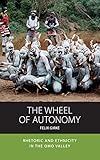The Wheel of Autonomy : Rhetoric and Ethnicity in the Omo Valley / Felix Girke.
Material type: TextSeries: Integration and Conflict Studies ; 18Publisher: New York ; Oxford : Berghahn Books, [2018]Copyright date: ©2018Description: 1 online resource (308 p.)Content type:
TextSeries: Integration and Conflict Studies ; 18Publisher: New York ; Oxford : Berghahn Books, [2018]Copyright date: ©2018Description: 1 online resource (308 p.)Content type: - 9781785339509
- 9781785339516
- Differentiation (Sociology) -- Ethiopia
- Guji (African people) -- Ethiopia -- Ethnic identity
- Karo (African people) -- Ethiopia -- Ethnic identity
- Karo (African people) -- Omo River Valley (Ethiopia and Kenya) -- Ethnic identity
- SOCIAL SCIENCE / Anthropology / Cultural & Social
- Ethiopia, Rhetoric, Ethnicity, Social Integration, Omo River, Autonomy
- 305.8009633 23
- DT380.4.K357 .G575 2018
- online - DeGruyter
| Item type | Current library | Call number | URL | Status | Notes | Barcode | |
|---|---|---|---|---|---|---|---|
 eBook
eBook
|
Biblioteca "Angelicum" Pont. Univ. S.Tommaso d'Aquino Nuvola online | online - DeGruyter (Browse shelf(Opens below)) | Online access | Not for loan (Accesso limitato) | Accesso per gli utenti autorizzati / Access for authorized users | (dgr)9781785339516 |
Frontmatter -- Contents -- Illustrations -- Acknowledgements -- Introduction: How Do They Do It? -- Chapter 1 A Rhetorical Approach to Groups and Ethnicity -- Chapter 2 Categories of Being Kara -- Chapter 3 Ethnicity within Kara The Demotion of the Bogudo -- Chapter 4 The Moguji: All That Is Not Kara -- Chapter 5 The Schism and Other Predicaments of the Moguji -- Chapter 6 The Regional Other in the Cultural Neighbourhood -- Chapter 7 South Omo in Kara Terms -- Chapter 8 The Cleverness of the Kara -- Chapter 9 Seeing Like a Tribe -- Conclusion -- Glossary of Non-English Terms -- Glossary of Places and People -- References -- Index
restricted access online access with authorization star
http://purl.org/coar/access_right/c_16ec
How do the Kara, a small population residing on the eastern bank of the Omo River in southern Ethiopia, manage to be neither annexed nor exterminated by any of the larger groups that surround them? Through the theoretical lens of rhetoric, this book offers an interactionalist analysis of how the Kara negotiate ethnic and non-ethnic differences among themselves, the relations with their various neighbors, and eventually their integration in the Ethiopian state. The model of the “Wheel of Autonomy” captures the interplay of distinction, agency and autonomy that drives these dynamics and offers an innovative perspective on social relations.
Mode of access: Internet via World Wide Web.
In English.
Description based on online resource; title from PDF title page (publisher's Web site, viewed 25. Jun 2024)


